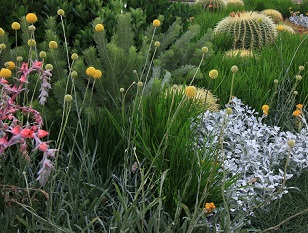The Practicalities of Horticulture Studies with ACS
 Learning a practical profession, like horticulture, via an online course might seem strange and unlikely at first sight. However, at ACS we have developed a very simple way of incorporating practical work into the assignments that are prepared after each lesson for the tutors to mark. It works in this way.
Learning a practical profession, like horticulture, via an online course might seem strange and unlikely at first sight. However, at ACS we have developed a very simple way of incorporating practical work into the assignments that are prepared after each lesson for the tutors to mark. It works in this way.
Each lesson covers a different topic. The teaching materials provided contain a great deal of basic and detailed information. The student reads all of this and then has to perform a set task or tasks. After the task has been completed part of the assignment is to report on the task. This best understood with some examples.
Students taking the Water Gardening course will study different aspect of the subject such as pond design and choice of plants. At the end of lesson 7 the students undertake this set task.
Visit or contact a specialist water garden supplier and obtain catalogues of their water plants. Obtain some water plants that will grow in your area and set up a water garden in which to grow them. The water garden can be as large or small, simple or complex as you desire. The only stipulation is that the water garden must be large and deep enough to grow at least one (preferably more) type of water plant. Write a brief report on your water garden and include a photo or sketch. What maintenance will be required to keep your water plants healthy?
The tutor will then be able to see how you approached the task and how successful you were and if necessary, the tutor will suggest changes to make. This set task brings together other aspects of the course taught earlier such as choice of pond lining materials.
Students taking the Botany 1 course have a very different set task in lesson 9 -
Obtain two sticks of fresh celery. Place one stick in a clean beaker (or other container) of water containing approximately 200ml of fresh water and set aside it on a bench at room temperature. The second stick of celery should be placed in a similar amount of water, but with 6 tablespoons of sugar added. Compare the appearances between the two sticks of celery at 2 day intervals for ten days. Record your observations.
This simple experiment very effectively tests how well the student has understood the theory covered in lesson 9 on the movement of water about a plant.
A final example comes from the Certificate in Garden Design course. The Lesson 11 assignment requires the students to visit local parks and criticise their design.
- Find a well-designed park. If you live in an isolated area or have no good parks in your area, you may work off something recorded in a book or magazine, though a real park is preferable. Roughly sketch the layout of the park (or lack of layout). Describe what is good about the design.
- Find a badly designed park. Again, produce a rough sketch of the park plus a written commentary.
- Look at a Park in your local area and consider its design. Draw a very rough sketch plan.
i. Write one page of notes explaining why you think that park was designed as it was. What purposes do you think the designer had? What criteria do you think were applied?
ii. Then, discuss with others in your area how the park might be improved. Record all your ideas.
PRODUCTIVE AND EFFECTIVE LEARNING
This style of teaching and learning is very productive and effective because it prompts the student to think for themselves about specific problems, using the knowledge gained in the previous lessons. As the courses progress more of the material from previous lessons is used in the set tasks. So in summary, although these are on-line courses, there is still plenty of opportunity for students to get their hands dirty carrying out practical tasks that they will be required to carry out during their professional careers.
DETAILED, COMPREHENSIVE STUDIES WITH ACS
At ACS we have a comprehensive approach to your learning.
Your 'learning package' includes:
- Course notes.
- Self-assessment quizzes.
- Assignment feedback.
- You can interact one on one with a professional tutor with decades of experience - just email, phone or log on to chat to connect with them.
- Depending upon your course, your studies may involve independent research, interviews, practical exercises, assessments, Problem Based Learning projects,and more.
[14/03/2025 23:28:18]
More from ACS
Over 150 short courses, certificates and diplomas covering landscaping, crops, plants of all types and general gardening.